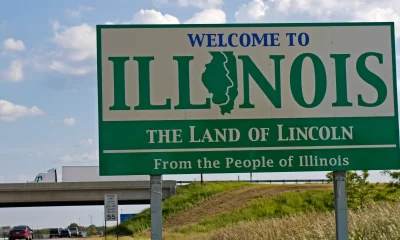Business
Pot Use Lower Among Illinois Teens Who Live Near Medical Dispensaries

The findings on teenage cannabis use come from researchers at the University of Illinois Urbana-Champaign.
An Illinois teenager living in a zip code with a medical cannabis dispensary is less likely to have used pot, according to new research.
The findings, which come from researchers at the University of Illinois Urbana-Champaign, showed that “about 18.3% of the youths living in Illinois ZIP codes with medical dispensaries reported they used cannabis during the prior year compared with 22.4% of those who lived in ZIP codes without these businesses,” according to Illinois News Bureau, a news service at the university.
“Likewise, fewer students – 12% – with medical dispensaries in their ZIP codes reported they had used cannabis during the prior 30 days, compared with 15.6% of their peers who lived in other ZIP codes, the researchers found,” the Illinois News Bureau reported.
The findings were based on the 2018 Illinois Youth Survey, a “biennial assessment conducted by the Center for Prevention Research and Development” at the university that included a sample of 10,560 young people in the state.
According to the news bureau, the “anonymous survey [asked] students in the eighth, 10th and 12th grades at schools across Illinois about various health and social issues, including their alcohol, tobacco and drug use,” while the data “were collected between January and June 2018,” when there were 53 operational medical cannabis dispensaries in the state. The survey was conducted before Illinois legalized recreational cannabis, which launched in January of 2020.
“There’s good news, and there are still reasons to be cautious and continue monitoring things,” said Doug Smith, the director of the Center for Prevention Research and Development at the university who is also a professor of social work and an expert on substance use in teens and young adults. “The good news is that it looks like in Illinois there was no immediate impact on adolescent substance use rates after medical dispensaries came on. In fact, we found that across the whole sample, those who lived in a ZIP code with a dispensary were less likely to have used cannabis during the past 30 days or one year.”
Smith admitted that the findings of the survey did not invite an obvious explanation.
“It’s a head-scratcher to be honest,” Smith said, as quoted by the news bureau. “The only reason I can think of is that in 2018 there were only 53 dispensaries in operation across the state of Illinois. It could be that the state was just not saturated enough with these facilities to see an effect at that time.
“However, we need to combat the hysteria that legalizing cannabis is going to have a wild and resounding impact on teens in terms of substance use rates and prevalence,” Smith added. “That’s simply not the case.”
The news bureau has more on the survey’s findings:
“The average age of the students surveyed was 15 years old. Most of the students in the sample were white (43%) or Latino (26%). Consistent with national data, cannabis usage significantly increased as Illinois students progressed from eighth to 12th grade, regardless of whether there was a dispensary in their ZIP code, the researchers found. Most of those surveyed – 47% – were from suburban Chicago, while 21% were from other cities, about 18% lived in rural areas and 14% resided in the city of Chicago. About 32% of the Chicago youths in the study lived in ZIP codes where medical cannabis dispensaries were operating compared with 3.5% of those living in rural areas. Cannabis usage was more prevalent in more populated areas, the data indicated. Overall, 29% of students living in the city of Chicago reported they had used cannabis, compared with 19% of those from the Chicago suburbs, 22% of students from other urban areas and 19% of rural students, according to the study.”
Source: https://hightimes.com/news/pot-use-lower-among-illinois-teens-who-live-near-medical-dispensaries/
Business
New Mexico cannabis operator fined, loses license for alleged BioTrack fraud

New Mexico regulators fined a cannabis operator nearly $300,000 and revoked its license after the company allegedly created fake reports in the state’s traceability software.
The New Mexico Cannabis Control Division (CCD) accused marijuana manufacturer and retailer Golden Roots of 11 violations, according to Albuquerque Business First.
Golden Roots operates the The Cannabis Revolution Dispensary.
The majority of the violations are related to the Albuquerque company’s improper use of BioTrack, which has been New Mexico’s track-and-trace vendor since 2015.
The CCD alleges Golden Roots reported marijuana production only two months after it had received its vertically integrated license, according to Albuquerque Business First.
Because cannabis takes longer than two months to be cultivated, the CCD was suspicious of the report.
After inspecting the company’s premises, the CCD alleged Golden Roots reported cultivation, transportation and sales in BioTrack but wasn’t able to provide officers who inspected the site evidence that the operator was cultivating cannabis.
In April, the CCD revoked Golden Roots’ license and issued a $10,000 fine, according to the news outlet.
The company requested a hearing, which the regulator scheduled for Sept. 1.
At the hearing, the CCD testified that the company’s dried-cannabis weights in BioTrack were suspicious because they didn’t seem to accurately reflect how much weight marijuana loses as it dries.
Company employees also poorly accounted for why they were making adjustments in the system of up to 24 pounds of cannabis, making comments such as “bad” or “mistake” in the software, Albuquerque Business First reported.
Golden Roots was fined $298,972.05 – the amount regulators allege the company made selling products that weren’t properly accounted for in BioTrack.
The CCD has been cracking down on cannabis operators accused of selling products procured from out-of-state or not grown legally:
- Regulators alleged in August that Albuquerque dispensary Sawmill Sweet Leaf sold out-of-state products and didn’t have a license for extraction.
- Paradise Exotics Distro lost its license in July after regulators alleged the company sold products made in California.
Golden Roots was the first alleged rulebreaker in New Mexico to be asked to pay a large fine.
Source: https://mjbizdaily.com/new-mexico-cannabis-operator-fined-loses-license-for-alleged-biotrack-fraud/
Business
Marijuana companies suing US attorney general in federal prohibition challenge

Four marijuana companies, including a multistate operator, have filed a lawsuit against U.S. Attorney General Merrick Garland in which they allege the federal MJ prohibition under the Controlled Substances Act is no longer constitutional.
According to the complaint, filed Thursday in U.S. District Court in Massachusetts, retailer Canna Provisions, Treevit delivery service CEO Gyasi Sellers, cultivator Wiseacre Farm and MSO Verano Holdings Corp. are all harmed by “the federal government’s unconstitutional ban on cultivating, manufacturing, distributing, or possessing intrastate marijuana.”
Verano is headquartered in Chicago but has operations in Massachusetts; the other three operators are based in Massachusetts.
The lawsuit seeks a ruling that the “Controlled Substances Act is unconstitutional as applied to the intrastate cultivation, manufacture, possession, and distribution of marijuana pursuant to state law.”
The companies want the case to go before the U.S. Supreme Court.
They hired prominent law firm Boies Schiller Flexner to represent them.
The New York-based firm’s principal is David Boies, whose former clients include Microsoft, former presidential candidate Al Gore and Elizabeth Holmes’ disgraced startup Theranos.
Similar challenges to the federal Controlled Substances Act (CSA) have failed.
One such challenge led to a landmark Supreme Court decision in 2005.
In Gonzalez vs. Raich, the highest court in the United States ruled in a 6-3 decision that the commerce clause of the U.S. Constitution gave Congress the power to outlaw marijuana federally, even though state laws allow the cultivation and sale of cannabis.
In the 18 years since that ruling, 23 states and the District of Columbia have legalized adult-use marijuana and the federal government has allowed a multibillion-dollar cannabis industry to thrive.
Since both Congress and the U.S. Department of Justice, currently headed by Garland, have declined to intervene in state-licensed marijuana markets, the key facts that led to the Supreme Court’s 2005 ruling “no longer apply,” Boies said in a statement Thursday.
“The Supreme Court has since made clear that the federal government lacks the authority to regulate purely intrastate commerce,” Boies said.
“Moreover, the facts on which those precedents are based are no longer true.”
Verano President Darren Weiss said in a statement the company is “prepared to bring this case all the way to the Supreme Court in order to align federal law with how Congress has acted for years.”
While the Biden administration’s push to reschedule marijuana would help solve marijuana operators’ federal tax woes, neither rescheduling nor modest Congressional reforms such as the SAFER Banking Act “solve the fundamental issue,” Weiss added.
“The application of the CSA to lawful state-run cannabis business is an unconstitutional overreach on state sovereignty that has led to decades of harm, failed businesses, lost jobs, and unsafe working conditions.”
Business
Alabama to make another attempt Dec. 1 to award medical cannabis licenses

Alabama regulators are targeting Dec. 1 to award the first batch of medical cannabis business licenses after the agency’s first two attempts were scrapped because of scoring errors and litigation.
The first licenses will be awarded to individual cultivators, delivery providers, processors, dispensaries and state testing labs, according to the Alabama Medical Cannabis Commission (AMCC).
Then, on Dec. 12, the AMCC will award licenses for vertically integrated operations, a designation set primarily for multistate operators.
Licenses are expected to be handed out 28 days after they have been awarded, so MMJ production could begin in early January, according to the Alabama Daily News.
That means MMJ products could be available for patients around early March, an AMCC spokesperson told the media outlet.
Regulators initially awarded 21 business licenses in June, only to void them after applicants alleged inconsistencies with how the applications were scored.
Then, in August, the state awarded 24 different licenses – 19 went to June recipients – only to reverse themselves again and scratch those licenses after spurned applicants filed lawsuits.
A state judge dismissed a lawsuit filed by Chicago-based MSO Verano Holdings Corp., but another lawsuit is pending.
Source: https://mjbizdaily.com/alabama-plans-to-award-medical-cannabis-licenses-dec-1/
-

 Business2 years ago
Business2 years agoPot Odor Does Not Justify Probable Cause for Vehicle Searches, Minnesota Court Affirms
-

 Business2 years ago
Business2 years agoNew Mexico cannabis operator fined, loses license for alleged BioTrack fraud
-

 Business2 years ago
Business2 years agoAlabama to make another attempt Dec. 1 to award medical cannabis licenses
-

 Business2 years ago
Business2 years agoWashington State Pays Out $9.4 Million in Refunds Relating to Drug Convictions
-

 Business2 years ago
Business2 years agoMarijuana companies suing US attorney general in federal prohibition challenge
-

 Business2 years ago
Business2 years agoLegal Marijuana Handed A Nothing Burger From NY State
-

 Business2 years ago
Business2 years agoCan Cannabis Help Seasonal Depression
-

 Blogs2 years ago
Blogs2 years agoCannabis Art Is Flourishing On Etsy









